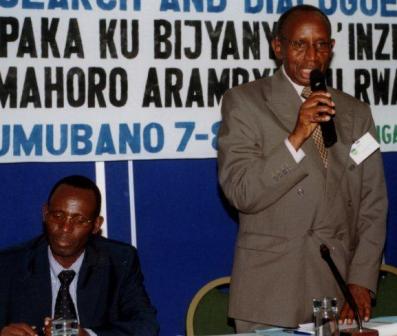Rwanda: Reconciliation 50 years after independence

This is an important week in Rwanda. It was 50 years ago, on the 1st July 1962, that Rwanda gained its independence. That’s not all, on the 4th July 1994, Rwandans were liberated from the genocidal regime. And it was only last month, the Gacaca courts in Rwanda were officially closed and marked the end of a period of transitional justice.
A time to reflect on the past and look into the future
These months are a time for Rwandans to reflect on their past, where they’ve come from and where they want to go. We talked to Dr. Naasson Munyandamutsa and Professor Pierre Rwanyindo who are heading up Interpeace’s local partner in Rwanda, the Institute of Research and Dialogue for Peace (IRDP). They shared with us their thoughts on the Gacaca courts and reconciliation process in Rwanda.
3 main reasons for setting up the Gacaca system
“First of all the Gacaca courts were tasked with reconstructing what happened during the genocide. Simply put they were finding the truth. It was also thought that by using as many courts as possible the prosecution of perpetrators could be accelerated. And probably the most challenging assignment of the Gacaca system was to reconcile all Rwandans and help rebuild the fabric of society,” explains Professor Rwanyindo.
The closing of the Gacaca courts
He continues to explain: “10 years ago, the Gacaca courts were set up. They were a system of community courts based on Rwandan tradition. Their main goal was to bring justice to Rwandans and achieve reconciliation among the different groups. It’s quite stunning when we think what has been achieved in these 10 years - altogether the Gacaca system handled more than 2 million individual cases.”
The origins of Gacaca lie in the Rwandan traditions
“Rwandan citizens know that Rwanda had to make tough decisions and come up with unusual solutions to meet the desire for justice. The Gacaca process has allowed us to search for the truth and rebuild a society which has been torn apart by violence of the most brutal kind,” adds Dr. Munyandamutsa when asked why the Gacaca courts have been chosen as a solution for the Rwandan context.
"I think Gacaca has turned out to be the best possible option for our country. We were trying to achieve justice in order to move on to the next stage which is reconciliation. And of course we have not reached our destination yet and need to continue to work towards unity and reconciliation. By initiating research and dialogue processes on obstacles to lasting peace that’s exactly what we at IRDP are doing," said Professor Rwanyindo.
A unique path to reconciliation
Dr. Munyandamutsa picks up by adding: “The Gacaca process, whether we like it or not, is unprecedented. The Gacaca system established a binding legal framework in which community members were able to ask questions about the past, no matter how terrifying they might be. That takes a lot of political courage which is absolutely essential if a society is to recover.”
Finding out what truly happened during those dark days of the genocide was one of the main tasks that the Gacaca process set out to achieve. Dr. Munyandamutsa however points out that there is a price that has to be paid for the truth: “By setting up the Gacaca process, our society has chosen to go with the belief that truth heals. But things are not that simple. The truth can also hurt. Some of the truths that were revealed during the Gacaca process were quite traumatizing for our society. And then the truth often differs in the eyes of the beholder – perspectives differ depending on whether you are a victim or a perpetrator.”
Capturing the events of the past for future generations
Both peacebuilders, however, ended the conversation on a positive note: “Gacaca attempted to put our pain of the past into words and symbolically tried to heal our wounds. Of course such a process has limitations and can be criticized but we have succeeded in reconstructing pieces of our past for the future generations to come.”
